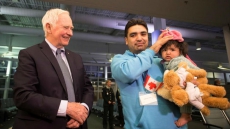OTTAWA — Move over Angry Birds, angry extremists are looking to capture more than just market share and give new meaning to the phrase killer app.
The Islamic State in Iraq and the Levant's online reach seemed to know no bounds in 2015, with brutal YouTube video executions, Twitter messaging and even good old-fashioned chat rooms, but defence contractors and security groups are now warning about the extremist organization developing its own smartphone application.
It can be used on Android devices and gives access to the online portal Amaq News Agency, which western intelligence officers, who spoke on background, claim is associated with the Islamic State's propaganda arm.
The app also contains written accounts of life under the self-declared caliphate, battlefield reports, statements on executions and perhaps most importantly videos.
Canada's top military commander says the app doesn't represent some great technical achievement because the group strives to put
"a veneer of sophistication" on whatever they do online.
"Let's face it. It's not a hugely sophisticated step to produce an app," said Gen. Jon Vance, the chief of defence staff, in a recent interview with The Canadian Press.

What is concerning for western intelligence and military is how it will be used to distribute propaganda, recruit new fighters and potentially aid in the self-radicalization phenomenon that is proving a challenge for those same agencies to counter.
Much was made in the beginning of the conflict about the production values associated with online Islamic State videos. Smartphone technology makes that sort of brainwashing more easily accessible at time when western governments still haven't fully wrapped their heads around the first wave.
Vance says the extremists "wallpaper their true nature with sophisticated strategic communications, mostly design to incite terror and fear" and the app is attempt to gain some "legitimacy," something that he predicts will eventually fail.
Throughout the fall there have been sporadic reports of those who've flocked to the Islamic State's call — or worked for them in occupied territories — fleeing because of brutal conditions and oppression.
The development of the app underscores for Vance, a veteran battlefield commander who fought in Afghanistan, the need for a comprehensive strategy.
"You can't just deal with them on a military basis, strictly by attacking their tactical power," he said. "They have to be dealt with across a broad range, including their messaging. Their ability to reach people. Their ability to try and radicalize — or support the radicalization of people. And it is a concern. I think it's been stated by many that their message, freely accessed, can appeal to some."

The Liberal government is in the process of reshaping Canada's military mission in the Iraq and Syria, where Defence Minister Harjit Sajjan has been on fact-finding mission this week.
In a conference call with the reporters, the former Vancouver police officer and reserve force colonel, who also fought the counter-insurgency war in Kandahar, says politicians and decision-makers need to appreciate they're not dealing with a conventional enemy.
"It's like a big organized crime group with tentacles all over," Sajjan said. "They don't recognize jurisdictions."
Aside from a more sophisticated approach to dealing with online propaganda, Sajjan is advocating for governments and the public to take a wider, more long-term view of the fight than just bombs and bullets.
He says it's neccesary to look beyond the existing battlefields in the Middle East and consider potential trouble spots down the road where there are underdeveloped economies and large groups of unemployed youth.
"The conversation of development comes (down) to — sometimes — 'Oh, you're taking a soft approach,'" he said. "Sometimes that approach — keeping people's lives better — and those young kids working, especially in Africa where the current (unemployment) stats are around 50 per cent. Keeping people working is actually preventing radicalization."




